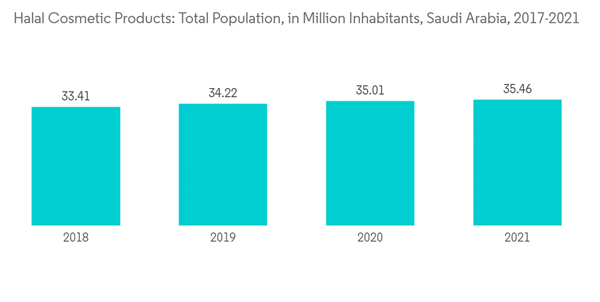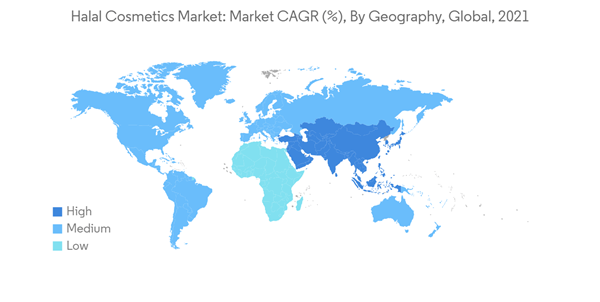The pandemic has created opportunities for new product lines such as creams, face creams, eye care, and sanitizers. The outbreak has modified consumer demand for above-the-mask products such as eye care, eye makeup, hand creams, face creams, and others. Most of the traditional markets across the globe are getting saturated. However, the Muslim community is developing fast-growing consumer products and segments worldwide. One of these most promising segments witnessing the fastest growth in recent years is the halal cosmetics products market. This segment offers a key growth opportunity for personal care and cosmetics manufacturers worldwide. For instance, in June 2021, the skin care company Flora & Noor introduced a line of halal skin care. The company offers body products like body butter, scrubs, and bath bombs, in addition to cleansers, toners, serums, moisturizers, and masks. Flora & Noor is available at floraandnoor.com, Walmart.com, Amazon, and Miiriya.
Color cosmetic products are growing at the fastest growth rate in the global halal cosmetic products market, attributable to the increasing number of young Muslim population associating their lifestyle and appearance with Islamic rules. In the range of halal cosmetics, regulations for cosmetics do not directly or indirectly affect the average user to participate in religious rituals. They are free from animal cruelty, caring for the environment, not harming one's body (eating natural formulations, organically grown products, and those free from pesticides or ingredients deemed harmful to the body), and fulfilling corporate social responsibility (which includes fair trade and no exploitation of workers).
Halal Cosmetic Products Market Trends
Growing Muslim Population Boost the Demand for Halal Cosmetics
Halal cosmetics have witnessed significant adoption among Muslim consumers owing to the increased demand for personal grooming and trending beauty products that adhere to religious loyalties. The halal cosmetics market has expanded its product base to tap into the cosmetics market, owing to increased demand for halal cosmetic products worldwide. For instance, in October 2021, Mikyajy unveiled their new 100% halal color cosmetics for the Middle Eastern girl. These natural cosmetics are free of alcohol, gelatin, keratin, and collagen. They're also vegan and cruelty-free. The growth of the global halal cosmetics market has driven owing to the rise in purchasing power of the growing Muslim population. The desire of young Muslim women to associate their interest in fashion & makeup with Islamic loyalties in countries such as Saudi Arabia, Iran, United Arab Emirates, Malaysia, and Indonesia and consumers equally interested in fashion and makeup trends have fueled the consumption of halal cosmetics, which will spur the global halal cosmetics industry. These factors create lucrative opportunities for multinational players operating in the global halal cosmetics market.Burgeoning Demand for Cosmetics From Middle-East Region
Demand for cosmetic products in the Middle East Region is increasing rapidly, with the United States Emirates and Saudi Arabia being one of the largest emerging markets globally. This region has a large Muslim population, thus giving halal cosmetic products a lucrative opportunity for growth. Furthermore, Saudi Arabia has one of the prominent markets for cosmetics and fragrance products in the Middle East. Consumers in the country tend to spend substantially on their appearance, supplementing cosmetics growth. The high percentage of the Muslim population in the country has resulted in a rise in demand for halal cosmetics and fragrances. Such factors have allowed global brands and online retailers to expand their offerings to capture the demand. Owing to the demand for halal-certified products in the region, Saudi Arabian PIF (Public Investment Fund) launched its new company named Halal Products Development Company in October 2022. The company aims to manufacture personal care and cosmetic products locally in Saudi Arabia and to export halal-certified products across the world.Halal Cosmetic Products Industry Overview
The global halal cosmetic products market is a highly competitive market, with the presence of various domestic and international players. Some players with a wide range of halal cosmetics products are Ecotrail Personal Care, IVY Beauty Corporation, The dUCk Group, Clara International Beauty Group, and INIKA Organic, among others. Manufacturers are focusing on leveraging opportunities posed by the market studied to expand their revenue base. Product launches, certifications by reputed and authentic organizations, and expansions in terms of geographical presence & product offerings were a few of the competitive strategies adopted by the manufacturers in the market.Additional Benefits:
- The market estimate (ME) sheet in Excel format
- 3 months of analyst support
This product will be delivered within 2 business days.
Table of Contents
Companies Mentioned (Partial List)
A selection of companies mentioned in this report includes, but is not limited to:
- INIKA Organic
- IVY Beauty Corporation
- Clara International Beauty Group
- Ecotrail Personal Care (Iba Halal Care)
- The dUCk Group
- INGLOT Cosmetics
- Sampure Minerals
- Halal Beauty Cosmetics
- Talent Cosmetics Co. Ltd
- Amara Halal Cosmetics










